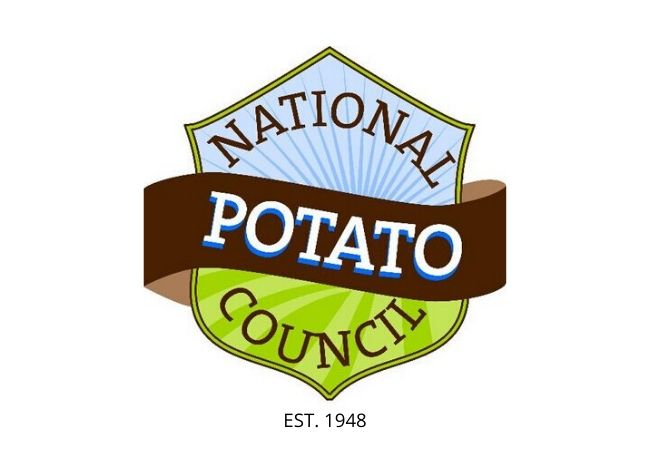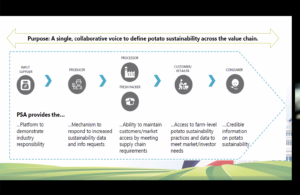
Recapping the National Potato Council’s summer meetings
The subcommittees of the National Potato Council (NPC) met virtually July 26-28 to discuss issues facing the U.S. potato industry and goals for the NPC.
Some always busy sessions include the environmental, legislative and trade affairs meetings. Also meeting this year was the long-range planning committee, which took a look at NPC goals through 2025.
A few highlights from the meetings included:
Long Range Planning Committee
While the committee has five pillar goals, listed below, an idea was floated to identify subgoals on a yearly basis, as situations and circumstances can often change quickly, with the pandemic being an extreme example.
Changes to the taxation system are a growing concern for farmers, including the proposed changes to the estate tax, which could make it harder to pass on multigenerational farms. National Potato Council CEO Kam Quarles said the NPC is part the National Agriculture Tax Coalition and keeping a close eye on any changes that would negatively affect growers.
National Potato Council member Jason Stoddard, seed potato grower from Idaho, raised concerns about tax issues and how they could negatively impact family farms. Asked if tax issues should be a bigger priority for NPC.
— Spudman Magazine (@SpudmanMag) July 26, 2021

Last year, the Potato Sustainability Alliance (PSA) was established to address industry-wide agendas and approaches to sustainability. In January, the PSA lost its executive director and the board is currently seeking to fill the position. NPC COO Mike Wenkel said the goal is to funnel the industry’s sustainability approach through PSA.
Washington grower Grant Morris would like to see growers have more input.
Potato grower Grant Morris of Washington would like to see growers have bigger input on potato industry-wide sustainability goals and plans, which includes shippers, packers and processors as well.
— Spudman Magazine (@SpudmanMag) July 26, 2021
Legislative Affairs Committee
In September, the United Nations will have a Food Systems Summit in Rome. NPC leaders and correspondents said everyone in agriculture should pay close attention to the summit, as international influence will likely put pressure on U.S. policymakers to follow suit. One area to watch is the idea of true cost of food, which would link a product’s cost with the environmental impact of producing it.
.@ThisSpudsForYou: Potato industry should keep close eye on upcoming United Nations food systems summit. International initiatives could lead to pressure on US policymakers, i.e. more warning labels on food or “true cost of food” reforms with regard to impact on climate change.
— Spudman Magazine (@SpudmanMag) July 27, 2021
Potatoes and the school breakfast program, as well as nutritional value standards, will remain a big priority.
.@ThisSpudsForYou @KamQuarles said: It’s going to be an ongoing task to make sure #potatoes are treated the same as other fruits and vegetables in school breakfast program.
— Spudman Magazine (@SpudmanMag) July 27, 2021
Major questions regarding ag labor reform: pic.twitter.com/j6clIYOJ59
— Spudman Magazine (@SpudmanMag) July 27, 2021
Trade Affairs Committee
The ongoing fresh potatoes-to-Mexico saga led the committee discussion. Although the Mexican Supreme Court ruled unanimously in April in favor of U.S. fresh access to all of Mexico, the Mexican potato producer federation, CONPAPA, has secured the ability to test incoming potatoes from the U.S. In addition, rules of pest testing have changed in recent months.
“The past 2-3 years, there’s been about one actionable pest find every 3-4 months. Since new testing requirement, it’s one actionable pest find every week. … It’s pretty obvious what is happening. The battle is moving from legal process to the regulatory process.” — @KamQuarles
— Spudman Magazine (@SpudmanMag) July 28, 2021
With regard to Japan, the largest importer of U.S. potato products, tariffs on processing potatoes and processed products have either been eliminated or are close to be eliminating, leaving U.S. producers on even footing with competitors. Now, attention turns toward getting fresh access to Japan. Longtime NPC trade consultant Matt Lantz said getting such access will be a long process. His associate Adam Hollowell added:
“This is going to be a challenging request, to put it mildly. … The Japanese government doesn’t want to be working on it. We’re going to have to make sure the USDA has all the (info) need and Japan has all they need.” — trade expert Adam Hollowell.
— Spudman Magazine (@SpudmanMag) July 28, 2021
In China, the U.S. was able to get a deal on importing chipping potatoes last year, which Lantz said was a big win because no new deal trade with China seems to be on the horizon. The Chinese government has included certain trade stipulations, which are within international agreements, and meeting those will require a lot of work before potatoes actually start shipping to China. That includes convincing a processor to invest millions of dollars in factory changes.
Covid has slowed down process because travel to China hasn’t been possible over the past year, said John Toaspern of @Potatoes_USA. Looking forward to getting going on this trek soon, starting with getting sample shipments.
— Spudman Magazine (@SpudmanMag) July 28, 2021
While trade with Mexico, Japan and China led the discussion, NPC staff and members also addressed numerous other trade partners and topics, including the recent influx of frozen potatoes from the European Union. EU frozen fry imports were up 65% in the past year, and up 980% over the past five years.
John Toaspern, marketing head at Potatoes USA, noted that five years ago imports from the EU were almost nonexistent, adding that the vast majority of frozen fry imports to the U.S. still come from Canada’s major processors, which also have presence in the U.S.
The NPC encouraged the USDA to look into possible tariffs in 2020, but Quarles said that was largely a preventative measure to avoid excess foodservice product influx during the pandemic. Toaspern said buyers of EU frozen fries include Trader Joe’s and Whole Foods, as well as smaller outlets in the Eastern U.S. Research needs to be done on why those buyers are seeking EU product and what U.S. producers can do to fill that market domestically.
Environmental Affairs Committee
Quarles expressed concern over proposed clean water regulations that could affect farmers who use pesticides.
“Farmers could be caught in having to have National Pollution Discharge Elimination System (NPDES) permits, which were originally set for factories,” Quarles said. The way the regulations are being challenges in what Quarles called a highly partisan issue could not only put farmers in the crosshairs, but public health agencies, such as mosquito elimination services, as well.
“It could potentially put farmers in jeopardy simply applying pesticides over decades in fields that never would have running water through them (barring something very unusual),” said Quarles, who used a once-in-a-century-type flood as an example.
NPDES permits are highly regulated and even minor violations carry hefty fines — $37,500 per day per violation — which is why Quarles in concerned should growers be forced to carry permits.
Ed Ruckert, an environmental legal correspondent of the NPC, shared an update on the Endangered Species Act (ESA) and its impact on chemical use, which he called “one of the most challenging issues confronting agriculture,” adding that it will likely remain so for the foreseeable future.
“We need an overhaul in (the review process),” said Ruckert, adding that the addition of ESA expert Jake Li to the Environmental Protection Agency should be a productive one. “He has a lot of background in the ESA area and understands that the courts in the place to develop policy. … He will be the one to take the lead in coming up with the changes to the review process.”







